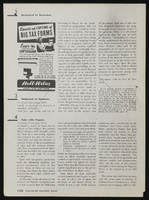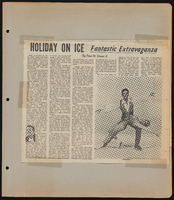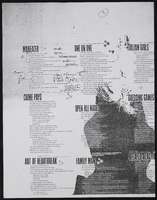Search the Special Collections and Archives Portal
Search Results
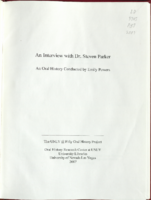
Transcript of interview with Dr. Steven Parker by Emily Powers, December 19, 2006
Date
2006-12-19
Archival Collection
Description
Dr. Steven Parker grew up and went to school in Connecticut. His parents were caterers and taught him a solid work ethic through example. His only sibling was finishing a post doctorate at Yale and had accepted a job at one of the Cal State schools when his life was tragically ended. Steven graduated from Assumption College in Massachusetts with a bachelor's in political science and got a scholarship to State University of New York at Albany. About hallway through his Master of Public Administration degree, the dean encouraged him to go on for his doctorate. He finished his PhD in 1971, and got a job at Western Illinois University which he started on September 15, 1971, the same day his son was born. Alter 8 years (and another child) in Illinois, Steve and his wife were ready to leave. He had attended a public administration conference in Baltimore in the spring of 1975, and was interviewed by Dina Titus and Tom Wright of UNLV. He had several other job offers, but UNLV looked like the best possibility, so he and his family moved to Las Vegas. Dr. Parker's title at UNLV was associate professor and department chair, although Dina Titus actually chaired the department his first semester here. He took over as chair in the spring of 1980. Steven started when Brock Dixon was interim chair, and has served under university presidents Leonard "Pat" Goodall, Bob Maxson, and Carol Harter. Today Dr. Parker teaches American Presidency and American government every semester, Natural Resource Policy and Political Corruption and Political Ethics once or twice a year, and occasionally teaches Urban Government. He also continues as the director of the University Forum Lecture Series, which was initiated by Tom Wright more than 23 years ago.
Text
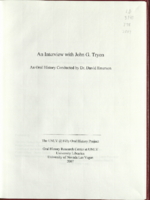
Transcript of interview with John G. Tryon by Dr. David Emerson, February 21, 2006
Date
2006-02-21
Archival Collection
Description
John G. Tryon was one of the early leading figures in the Engineering Department at UNLV. He grew up in Washington, D.C., the oldest of three sons. His father worked with the National Bituminous Coal Commission during the Depression and his mother was editor of the American Association of University Women's Publications. John went directly to University of Minnesota after high school graduation and earned a bachelor's in physics. During WWII he served in the Army Signal Corps and then went back to Cornell University to get his doctorate. His post doctoral work experience includes six years at Bell Telephone Laboratories, eleven years at University of Alaska, and six years at Tuskegee Institute. In 1974, Dr. Tryon interviewed at UNLV and was hired. The faculty carefully built up the curriculum, adding classes one at a time. John introduced a senior engineering design course modeled after one that pioneered at Dartmouth. He had also introduced this particular course at University of Alaska and Tuskegee. John was a member of the Academic Standards Committee at UNLV which helped set standards for academic probation and semester length. He has strong opinions on keeping engineering students who show promise and interest, and letting go of students whose academic strengths don't match the program. He believes students need to be matched to opportunity, be given the chance to find a niche that fits, and that they should not be given inflated grades or false hope. Dr. Tryon met his wife-to-be in Ithaca, New York, while attending Cornell University. His wife's mother, who was married to a botany professor, had invited him to Sunday dinner, something she had done for a number of students. John and his wife, who eventually became an English teacher, have two sons who grew to college age while they were in Alaska. Today they enjoy their church community, their family, and their circle of friends.
Text
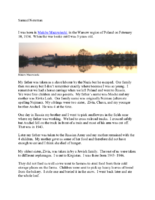
Biographical essay by Samuel Newman, 2014
Date
2014
Archival Collection
Description
Samuel Newman describes his experience during the Holocaust and being separated from his siblings at different orphanages. He was in Kyrgyzstan from 1943 to 1946, and at an orphanage in Poland until 1951. Newman trained in graphic arts and spent some time in the military in Israel. He came to the United States in 1968.
Text
Audio clip from interview with Glenn Tredwell, March 4, 2016 and April 14, 2016
Date
2016-03-04
2016-04-14
Archival Collection
Description
In this clip, Glenn Tredwell discusses how he came to Las Vegas, Nevada in 1975.
Sound
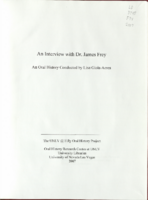
Transcript of interview with Dr. James Frey by Lisa Gioia-Acres, February 14, 2007
Date
2007-02-14
Archival Collection
Description
James Frey was born in Eureka, South Dakota, in 1941. His father worked in creamery and his mother was a registered nurse. When James was nine, the family,including his twin sister, relocated in Sioux Falls where his dad was plant manager for a dairy. He joined the YMCA in the fourth grade and ended up working for them until James attended Augustana College in Sioux Falls, graduating with a major in sociology and a minor in history. After graduation, he worked for three years at the YMCA in Sioux Falls as program director. He earned his master's degree in sociology at the University of Iowa in two years, and was hired at the YMCA in Whittier, California, where he worked for three years. While working in Whittier, James was offered a fellowship to Washington State University in Pullman. He committed to completing his doctorate in three years, and while still working on his dissertation began sending out applications. He sent one to UNLV and arrived in Las Vegas for an interview in 1974. James was hired as assistant professor of sociology at UNLV, and immediately established a survey center at the university. He also converted his dissertation into a book length manuscript and had it published, followed by other books and articles over the years. He conducted a survey on a very high-profile political race between Sheriff Ralph Lamb and his opponent, John McCarthy, which led to work for the State of Nevada, Yucca Mountain, and other entities. The survey program was eventually named the Cannon Center for Survey Research, after Senator Howard Cannon. In the course of his career, James was tenured, taught in London under a university sponsored program, spent a sabbatical in Washington, D.C., doing research, taught several classes, and served seven years as dean. He has detailed memories of the contributions of several university presidents, including Brock Dixon, Pat Goodall, Robert Maxson, Kenny Guinn, and Carol Harter. Today, Dr. James Frey and his wife of over thirty years, Carol, are both retired. He has made a smooth transition to president of his Rotary Club, Chairman of the Nevada Humanities group, and spectator at UNLV basketball and football games. He and his wife plan to stay in Las Vegas, close to their son and friends and neighbors they know and love.
Text
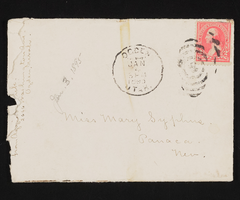
Letter and envelope from Aggie Herrick Ogden, Utah. to Mary Etta Syphus, Panaca, Nevada
Date
1895-01-03
Archival Collection
Description
From the Syphus-Bunker Papers (MS-00169). The folder contains an original handwritten letter, an envelope, a typed transcription of the same letter, and a copy of original letter attached.
Text
Pagination
Refine my results
Content Type
Creator or Contributor
Subject
Archival Collection
Digital Project
Resource Type
Year
Material Type
Place
Language
Records Classification


